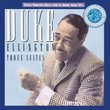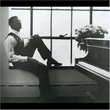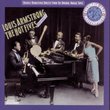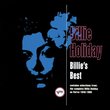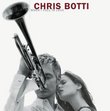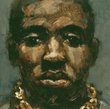| All Artists: Simon Rattle Title: Classic Ellington Members Wishing: 0 Total Copies: 0 Label: Angel Records Original Release Date: 9/26/2000 Release Date: 9/26/2000 Genres: Jazz, Pop, Classical Styles: Traditional Jazz & Ragtime, Orchestral Jazz, Easy Listening Number of Discs: 1 SwapaCD Credits: 1 UPCs: 724355701428, 0724355701459, 724355701459 |
Search - Simon Rattle :: Classic Ellington
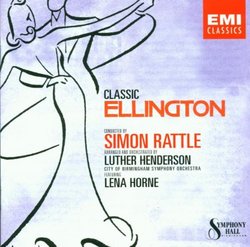 | Simon Rattle Classic Ellington Genres: Jazz, Pop, Classical
Duke Ellington, a restless experimenter, flirted occasionally with the traditional symphony orchestra, most memorably in 1963, when he recorded his band with three European classical orchestras. This new development of tho... more » |
Larger Image |
CD DetailsSynopsis
Amazon.com Duke Ellington, a restless experimenter, flirted occasionally with the traditional symphony orchestra, most memorably in 1963, when he recorded his band with three European classical orchestras. This new development of those experiments is lent authenticity by the involvement of Lena Horne, who sang with Ellington in 1940, and Clark Terry, who worked with Ellington through the 1950s (and performs a hilarious vocal and trumpet duet with himself in the final blues here). The orchestration is by Luther Henderson, and he, too, worked with Ellington, shortly before the latter's death, in 1974. Along with these veterans, seven younger jazz musicians, including Joshua Redman, Regina Carter, Geri Allen, and Lewis Nash, are heard in excellent form. Although this CD is released by EMI Classics, the jazz contribution dominates, despite some out-of-tempo passages in "Solitude" and "Sophisticated Lady." Henderson's eclectic integration of traditionally separate elements works well, and Rattle's lively conducting of the Birmingham Symphony Orchestra demonstrates his commitment. Most of this material (some by Billy Strayhorn) didn't receive symphonic treatment from Ellington himself and is therefore doubly welcome in this very clear recording from Birmingham Symphony Hall. --Graham Colombé Similarly Requested CDs
|
CD ReviewsJazzMasterworks re-interpreted 09/26/2000 (5 out of 5 stars) "Having heard excerpts from this on the radio before it was released whetted my appetite,and I rushed out and bought the disc on day one.Why,you may ask,should you purchase this in preference to the Orchestra(s) of the Duke himself? Well,for one thing it's an album featuring a host of the best players from today(Lovano,Redman,Watson),players whom the Duke himself would surely have welcomed into his ranks (and who could complain about the compositions chosen?)For another,although this is'nt a priority for me(my own record collection ranging from the dawn of recording history to now),there's a very good quality of recording throughout in,but the real question is--to whom would this release be aimed at primarily...the classical enthusiast,the jazz enthusiast,which? Which particular pigeon hole should the marketing men slot this into?Answer--I don't know,because this a delight that really crosses categories, transcending mere factionalism, and suceeding in the same way that the "Third Stream" music of a few years ago was supposed to do,but conspicuously failed to deliver.Of course,Rattle has crossed musical divides before,mostly garnering praise,and I can't help but feel that his all-encompassing approach is the only sensible path,as so much can be lost to those whose loyalties are unwaveringly tied to one type of music or another(Gil Evans and his Hendrix tributes are another good example of broadening horizons for an audience of mainly jazz fans). So,let's hope that this real alternative to the Ducal catalogue has the success it deserves,and some more of the same would be nice...the music of Mingus would especially be suitable to this revisionist treatment,as this was concieved(if only in the head of the man himself)for a more classical interpretation.Try this,you'll think it money well spent."
|

 Track Listings (12) - Disc #1
Track Listings (12) - Disc #1